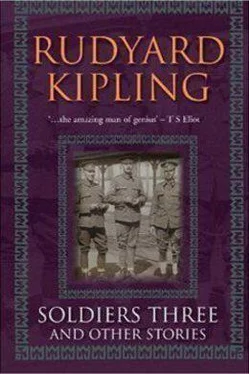Rudyard Kipling - Soldiers Three
Здесь есть возможность читать онлайн «Rudyard Kipling - Soldiers Three» весь текст электронной книги совершенно бесплатно (целиком полную версию без сокращений). В некоторых случаях можно слушать аудио, скачать через торрент в формате fb2 и присутствует краткое содержание. Год выпуска: 2014, Издательство: epubBooks Classics, Жанр: Классическая проза, на английском языке. Описание произведения, (предисловие) а так же отзывы посетителей доступны на портале библиотеки ЛибКат.
- Название:Soldiers Three
- Автор:
- Издательство:epubBooks Classics
- Жанр:
- Год:2014
- ISBN:нет данных
- Рейтинг книги:5 / 5. Голосов: 1
-
Избранное:Добавить в избранное
- Отзывы:
-
Ваша оценка:
- 100
- 1
- 2
- 3
- 4
- 5
Soldiers Three: краткое содержание, описание и аннотация
Предлагаем к чтению аннотацию, описание, краткое содержание или предисловие (зависит от того, что написал сам автор книги «Soldiers Three»). Если вы не нашли необходимую информацию о книге — напишите в комментариях, мы постараемся отыскать её.
Soldiers Three — читать онлайн бесплатно полную книгу (весь текст) целиком
Ниже представлен текст книги, разбитый по страницам. Система сохранения места последней прочитанной страницы, позволяет с удобством читать онлайн бесплатно книгу «Soldiers Three», без необходимости каждый раз заново искать на чём Вы остановились. Поставьте закладку, и сможете в любой момент перейти на страницу, на которой закончили чтение.
Интервал:
Закладка:
'"You black lump av dirt," I sez, "is this the way you dhrive your gharri? That tikka has been owin' an' fere–owin' all over the bloomin' country this whole bloomin' night, an' you as mut–walla as Davey's sow. Get up, you hog!" sez I, louder, for I heard the wheels av a thrap in the dark; "get up an' light your lamps, or you'll be run into!" This was on the road to the Railway Station.
'"Fwhat the divil's this?" sez the Capt'n's voice in the dhark, an' I could judge he was in a lather av rage.
'" Gharri dhriver here, dhrunk, Sorr," sez I; "I've found his gharri sthrayin' about cantonmints, an' now I've found him."
'"Oh!" sez the Capt'n; "fwhat's his name?" I stooped down an' pretended to listen.
'"He sez his name's Jungi, Sorr," sez I.
'"Hould my harse," sez the Capt'n to his man, an' wid that he gets down wid the whip an' lays into Jungi, just mad wid rage an' swearin' like the scutt he was.
'I thought, afther a while, he wud kill the man, so I sez:—"Stop, Sorr, or you'll, murdher him!" That dhrew all his fire on me, an' he cursed me into Blazes, an' out again. I stud to attenshin an' saluted:—"Sorr," sez I, "av ivry man in this wurruld had his rights, I'm thinkin' that more than wan wud be beaten to a jelly for this night's work—that niver came off at all, Sorr, as you see?" "Now," thinks I to myself, "Terence Mulvaney, you've cut your own throat, for he'll sthrike, an' you'll knock him down for the good av his sowl an' your own iverlastin' dishgrace!"
'But the Capt'n niver said a single wurrd. He choked where he stud, an' thin he went into his thrap widout sayin' good–night, an' I wint back to barricks.'
'And then?' said Ortheris and I together.
'That was all,' said Mulvaney; 'niver another word did I hear av the whole thing. All I know was that there was no e–vasion, an' that was fwhat I wanted. Now, I put ut to you, Sorr, is ten days' C. B. a fit an' a proper tratement for a man who has behaved as me?'
'Well, any'ow,' said Ortheris,'tweren't this 'ere Colonel's daughter, an' you was blazin' copped when you tried to wash in the Fort Ditch.'
'That,' said Mulvaney, finishing the champagne, 'is a shuparfluous an' impert'nint observation.'
Of Those Called
(1895)
We were wallowing through the China Seas in a dense fog, the horn blowing every two minutes for the benefit of the fishery craft that crowded the waterways. From the bridge the fo'c'sle was invisible; from the hand–wheel at the stern the captain's cabin. The fog held possession of everything—the pearly white fog. Once or twice when it tried to lift, we saw a glimpse of the oily sea, the flitting vision of a junk's sail spread in the vain hope of catching the breeze, or the buoys of a line of nets. Somewhere close to us lay the land, but it might have been the Kurile Islands for aught we knew. Very early in the morning there passed us, not a cable's–length away, but as unseen as the spirits of the dead, a steamer of the same line as ours. She howled melodiously in answer to our bellowing, and passed on.
'Suppose she had hit us,' said a man from Saigon. 'Then we should have gone down,' answered the chief officer sweetly. 'Beastly thing to go down in a fog,' said a young gentleman who was travelling for pleasure. 'Chokes a man both ways, y' know.' We were comfortably gathered in the smoking–room, the weather being too cold to venture on the deck. Conversation naturally turned upon accidents of fog, the horn tooting significantly in the pauses between the tales. I heard of the wreck of the Eric , the cutting down of the Strathnairn within half a mile of harbour, and the carrying away of the bow plates of the Sigismund outside Sandy Hook.
'It is astonishing,' said the man from Saigon, 'how many true stories are put down as sea yarns. It makes a man almost shrink from telling an anecdote.'
'Oh, please don't shrink on our account,' said the smoking–room with one voice.
'It's not my own story,' said the man from Saigon. 'A fellow on a Massageries boat told it me. He had been third officer of a sort on a Geordie tramp—one of those lumbering, dish–bottomed coal–barges where the machinery is tied up with a string and the plates are rivetted with putty. The way he told his tale was this. The tramp had been creeping along some sea or other with a chart ten years old and the haziest sort of chronometers when she got into a fog—just such a fog as we have now.'
Here the smoking–room turned round as one man, and looked through the windows.
'In the man's own words, "just when the fog was thickest, the engines broke down. They had been doing this for some weeks, and we were too weary to care. I went forward of the bridge, and leaned over the side, wondering where I should ever get something that I could call a ship, and whether the old hulk would fall to pieces as she lay. The fog was as thick as any London one, but as white as steam. While they were tinkering at the engines below, I heard a voice in the fog about twenty yards from the ship's side, calling out, 'Can you climb on board if we throw you a rope?' That startled me, because I fancied we were going to be run down the next minute by a ship engaged in rescuing a man overboard. I shouted for the engine–room whistle; and it whistled about five minutes, but never the sound of a ship could we hear. The ship's boy came forward with some biscuit for me. As he put it into my hand, I heard the voice in the fog, crying out about throwing us a rope. This time it was the boy that yelled, 'Ship on us!' and off went the whistle again, while the men in the engine–room—it generally took the ship's crew to repair the Hespa's engines—tumbled upon deck to know what we were doing. I told them about the hail, and we listened in the smother of the fog for the sound of a screw. We listened for ten minutes, then we blew the whistle for another ten. Then the crew began to call the ship's boy a fool, meaning that the third mate was no better. When they were going down below, I heard the hail the third time, so did the ship's boy. 'There you are,' I said, 'it is not twenty yards from us.' The engineer sings out, 'I heard it too! Are you all asleep?' Then the crew began to swear at the engineer; and what with discussion, argument, and a little swearing,—for there is not much discipline on board a tramp,—we raised such a row that our skipper came aft to enquire. I, the engineer, and the ship's boy stuck to our tale. 'Voices or no voices,' said the captain, 'you'd better patch the old engines up, and see if you've got enough steam to whistle with. I've a notion that we've got into rather too crowded ways."
'"The engineer stayed on deck while the men went down below. The skipper hadn't got back to the chart–room before I saw thirty feet of bowsprit hanging over the break of the fo'c'sle. Thirty feet of bowsprit, sir, doesn't belong to anything that sails the seas except a sailing–ship or a man–of–war. I speculated quite a long time, with my hands on the bulwarks, as to whether our friend was soft wood or steel plated. It would not have made much difference to us, anyway; but I felt there was more honour in being rammed, you know. Then I knew all about it. It was a ram. We opened out. I am not exaggerating—we opened out, sir, like a cardboard box. The other ship cut us two–thirds through, a little behind the break of the fo'c'sle. Our decks split up lengthways. The mizzen–mast bounded out of its place, and we heeled over. Then the other ship blew a fog–horn. I remember thinking, as I took water from the port bulwark, that this was rather ostentatious after she had done all the mischief. After that, I was a mile and a half under sea, trying to go to sleep as hard as I could. Some one caught hold of my hair, and waked me up. I was hanging to what was left of one of our boats under the lee of a large English ironclad. There were two men with me; the three of us began to yell. A man on the ship sings out, 'Can you climb on board if we throw you a rope?' They weren't going to let down a fine new man–of–war's boat to pick up three half–drowned rats. We accepted the invitation. We climbed—I, the engineer, and the ship's boy. About half an hour later the fog cleared entirely; except for the half of the boat away in the offing, there was neither stick nor string on the sea to show that the Hespa had been cut down."
Читать дальшеИнтервал:
Закладка:
Похожие книги на «Soldiers Three»
Представляем Вашему вниманию похожие книги на «Soldiers Three» списком для выбора. Мы отобрали схожую по названию и смыслу литературу в надежде предоставить читателям больше вариантов отыскать новые, интересные, ещё непрочитанные произведения.
Обсуждение, отзывы о книге «Soldiers Three» и просто собственные мнения читателей. Оставьте ваши комментарии, напишите, что Вы думаете о произведении, его смысле или главных героях. Укажите что конкретно понравилось, а что нет, и почему Вы так считаете.












